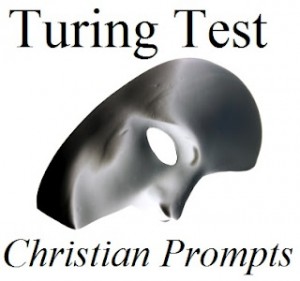This is the twelfth entry in the Christian round of the 2012 Ideological Turing Test for Religion. In this round, the honest answers of Christians are mixed in with atheists’ best efforts to talk like Christians. It’s your job to see if you can spot the difference. The voting link appears at the end of the entry, and you can look at all entries in this round here.
When (if ever) have you deferred to your philosophical or theological system over your intuitions?
(I’m going to narrow this to ethics.) I have no systematic ethics other than the following rough guidelines: “Remember God and nurture a relationship with him,” “Have compassion for others’ suffering and seek to understand them even when they are hurting me,” “Give to others as much as I reasonably can,” and, “Oppose oppression.” Subordinate to these is a fourth: “Speak no falsehood in malice.” Of course I fail to live up to these, but that is not quite the point. The point is that the first four rules are both intuitive for me (though not habitual) and, from what I can tell, Gospel- and prophetic-tradition-based. I rarely need to defer to theology over intuition because they usually align. The exception is that at times, in order to promote a long-term good, I must suppress my intuitive desire to avoid a short-term harm. For example, I will try to address a person who has slighted me in order to prevent them from slighting others in the same way; this is serving their long-term good, but it is counter-intuitive to me. However, once I have thought it through, my intuitions usually come into line with my more reasoned and prayerful consideration.
Are there people whose opinions on morality you trust more than your own? How do you recognize them? How is trusting them different than trusting someone’s opinion on physics?
There are no people whose opinions on morality I trust more than my own. I have a reputation as someone who is both reasonable and very concerned with morality; not many people I know would want me to emulate them in ethics, except to be more self-interested, which my friends often encourage. I do defer to some people’s opinions on other matters which sometimes impact morality. Some people have a better sense of social decorum. Other people, such as mental health professionals, have a better sense of psychology. I have favourite theologians and academics. I turn to these people when I have factual, interpretive, or emotional questions I need help with so that I can then make an ethical decision. You can see above that I have a particular ethical framework, and it would be hard for me to find someone who was coming from the same place. Physics is different: I have not studied physics and my intuitions don’t line up with physical laws, so I ask physicists. My own emotions bias my interpretation of others’ behaviour, so I ask for help there. But the only outside source I use for ethics is prayer, which helps straighten my priorities.
Can you name any works of art (interpreted pretty broadly: books, music, plays, poetry, mathematical proofs, etc) which really capture the way you see life/fill you with a sense of awe and wonder? You can give a short explanation or just list a few pieces.
Ugh. Christian art is usually so bad. I enjoy minor-key Christmas carols like “Silent Night” and “We Three Kings,” along with others songs like “The Parting Glass”. Fragments of The Chronicles of Narnia and The Lord of the Rings might count, and the whole of both works when read through Michael Ward’s Planet Narnia and Bradley Birzer’s J. R. R. Tolkien’s Sanctifying Myth. Madeleine L’Engle’s books are wonderful when I can ignore their syrup and snobbery. I really like Jane Austen’s views on psychology and on human folly, and on the topic of the latter I also like Calvin and Hobbes and Stephen Leacock’s Sunshine Sketches of a Little Town. As for poetry, I must stereotypically list John Donne and Gerard Manley Hopkins. Paradise Lost excites me, even if I disagree with its theology. More than any of these, I get a sense of the sublime from Pan’s Labyrinth. Arranged (a film) captures the way I feel about life sometimes. Occasionally I read litanies from the Book of Alternative Services as poetry. Altogether, I appreciate wabi-sabi, compassion, subversion, and emotional honesty. On another topic, I like how labyrinths, Buddhist temples, small liturgical churches, and Japanese gardens manage colour and space.
Click here to judge this entry, and, once you’ve voted, feel free to speculate and trade theories in the comments or look at other entries in this round.












